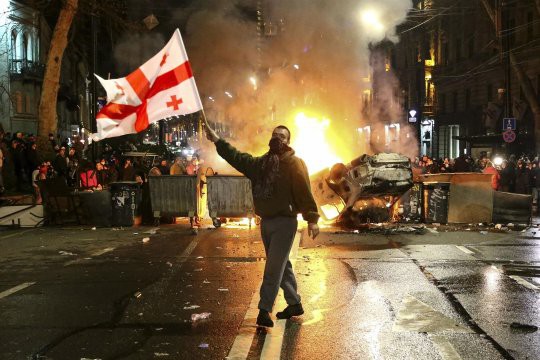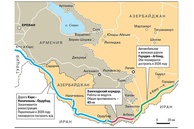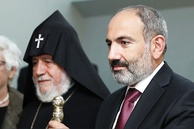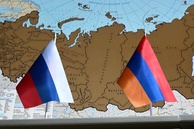Mass rallies against the policies of the incumbent government have been raging in two neighboring Transcaucasia republics Georgia and Armenia over the past month. The police have launched a fierce crackdown on thousands of protesters, hundreds have been arrested. While confrontation between the opposition and the ruling parties in the two republics looks similar on the face of it, the reasons for it are radically different. The Georgian authorities, trying to defend the remnants of sovereignty, are confronted by activists of foreign non-profit organizations, well-trained on the models of color revolutions and profusely sponsored by the West, led by politicians of the times of Saakashvili. In Armenia, the popular protest is aimed against the government of Pashinyan, who opted for a pro-western policy accompanied by the loss of sovereignty and territorial concessions to Azerbaijan.
In addition, protests in Armenia are devoid of any foreign support, which makes them different from the protests in Georgia, where the opposition is pushed and motivated by western centers. The West is urging the Georgian authorities “to guarantee compliance with citizens’ right to protest”[1], while ignoring the use of force during a crackdown on protesters in Armenia.
Time runs, the “rakes” are the same
It seems that statehood in Armenia is developing on the same scenario as in Georgia but lagging in time and with repetitions of the bitter mistakes of its neighbor. At present, the ruling Georgian Dream Party, not being pro-Russian, of which it is consistently accused by pro-western oppositionists, has begun to re-create Georgian sovereignty and identity, and has become pragmatic. The government is pursuing a fairly balanced policy, hinging upon the observance of own national interests, highly appreciates the benefits from trade and economic cooperation with Russia, which is what western partners have failed to offer it. Most of the population are aware how strongly the Georgian economy is connected with Russia – not on the basis of fabricated reports by western NPOs but proceeding from the reality.
This awareness is the result of decades of trial and error which the Georgian people have come through. M.Saakashvili came to power as a result of a “colour” coup in 2003. The excessively high expectations of patronage of western partners led Georgia to territorial losses in 2008. That was followed by a gradual coming to senses, which resulted in the removal, in 2012-2013, of M.Saakashvili and his supporters, who had been acting in defiance of national interests.
Armenia has been going through identical developments. In 2018, after the “velvet” revolution, the power went to favorites of pro-western NPOs headed by incumbent Prime Minister N.Pashinyan. The ill-considered foreign policy of the new government, largely dictated by western sponsors, resulted in territorial losses. The unrecognized Nagorno-Karabakh Republic of Armenia, as well as part of the territory of Armenia proper, went under the control of Azerbaijan, following a military and political confrontation of 2020-2023. All this time the ruling authorities have been trying to depart from cooperation with Russia, though Russia continues to be Armenia’s major trade partner. Considering that trade with the Russian Federation accounts for 40,1% of Armenia’s foreign trade[2], a break-up with Moscow will inevitably lead to the collapse of Armenian economy. But at present, the Armenian civil society is going through the waking-up-to-reality stage.
The specifics of Armenian protests
The time the protests have received initial support from representatives of the Armenian clergy, the most active and noticeable of them being the head of the Diocese of Tavush of the Armenian Apostolic Church, Archbishop Bagrat Galstanyan. Throughout the entire history of Armenia, the Armenian Apostolic Church has played a consolidating role. The protesters, now calling themselves the “Tavush for the Motherland” Movement, have proclaimed His Holiness Archbishop Bagrat their leader. His Holiness, being categorically against mixing political and religious activities, does not engage in any kind of agitation in churches.
The Movement has received support from opposition politicians, from the “Armenia” Alliance – part of the bloc of parties “Dashnaktsutyun”, “Revived Armenia” and “United Armenia”, which are all represented in parliament.
The protests broke out following a decision on delimitation of borders between Armenia and Azerbaijan, passed by the two parties at the end of April. Under the agreement, Baku will gain control of [3] four settlements in the Tavush Region (until the 1990s these settlements were part of the Azerbaijani Soviet Socialist Republic). According to the opposition, this runs counter to the Constitution of Armenia, the laws on national border and international treaties.
Popular protests against territorial concessions to Azerbaijan by the delimitation and demarcation of the border, which have been raging for nearly one month, have entered a hot phase.[4] Originating in different corners of Tavush, the rallies spread to the capital of Armenia.
In Yerevan, the protesters have been demanding resignation of Nikol Pashinyan. Urged by the leader of the “Tavush for the Motherland” Movement, Archbishop Bagrat Galstanyan, who had called for “a total disobedience campaign” across Armenia, the protesters began to make barricades in the streets. However, special police forces thwarted the attempts to paralyze traffic. As a result, according to Armenian Interior Ministry reports, on May 13 more than 170 activists[5] were arrested, and more than 220[6] after the rally on May 26. The police used force not only against the protesters but also against the journalists.
The purpose of the public disobedience campaign is to exert pressure on Armenian MPs, who should heed the appeal from the opposition, vote no-confidence in Nikol Pashinyan, and remove him from power. Given that the opposition lacks 19 votes for impeachment, opposition representatives believe that it is only a civil disobedience campaign that can force Pashinyan’s team to hear them. The instruments to be used in achieving the goal are the same as used by Pashinyan himself in 2018 against Prime Minister Serge Sargsyan, who was made to resign.
Opposition political forces in Armenia want Archbishop Bagrat Galstanyan to become a candidate for prime minister from the protest movement[7]. They have considered several candidacies for temporary prime ministers from both the political and religious spheres, but “in the course of discussions the participants failed to reach a consensus on any of the candidates. Given that only the candidacy of Bagrat Galstanyan produced no differences, he agreed to be nominated for prime minister”[8].
The archbishop said at a rally on May 26 that he had asked the Catholicos (the supreme head of the Armenian Apostolic Church Garegin II) to suspend his clerical service, which is incompatible with the status of candidate for prime minister [9] The Catholicos relieved the archbishop of clerical service but preserved his rank.[10]
Consequently, in present-day Armenia the Church has become the only institution, and the Tavush archbishop the only leader for opposition consolidation. For the first time in the history of post-Soviet Armenia, the people are consolidating not around a political or public figure, but around a representative of the clergy, personifying one of the basic elements of Armenian national identity – the Armenian Apostolic Church.
Protest leaders propose forming an interim government pending early parliamentary elections to be held within a year. However, the impeachment procedure against the incumbent prime minister in the Armenian National Assembly has not started yet, owing to lack of votes within the parliamentary opposition.
The attempts to discredit the Church
In response to critical remarks on the part of the clergy, Pashinyan and his team have summoned all their forces to discredit the Armenian Church headed by the Catholicos of All Armenians Garegin II. Pressure on the Armenian Apostolic Church intensified after talks between the prime minister and CIA Deputy Director David Cohen. [11]. In July 2022, Yerevan was visited by CIA Director William Burns. Following the visit, Nikol Pashinyan radically changed his stance and during a meeting in Prague under the aegis of the EU declared Nagorno-Karabakh a territory of Azerbaijan.
As a result, SNPO “Center for Public Relations and Information” began to spread disinformation on the so-called fabulous riches accumulated by Archbishop Bagrat Galstyan and also by the Catholicos. They are writing about multimillion bank accounts, businesses etc. All this is done for the sole purpose of destroying the reputation of the Church, the last fundamental pillar of Armenian state. What would happen to the country without this historical foundation, which led Armenia through the centuries?
The prime minister has lashed absolutely absurd and ungrounded accusations at the Armenian Apostolic Church, blaming it for thousands of years of betrayal of Armenians in the interests of third parties, blaming it for being an “agent of influence”. Attacks against Etchmiadzin were substantiated by Pashinyan with suspicions of tax evasion, so he threatened “to resolve the issue within the next two-three months”[12]. Right afterwards his party said “ready” and announced the possibility of expropriating the property of the Church[13]. Armeanian parliamentary Speaker Alen Simonyan made a provocative and inconsistent-with-reality statement that the Church should pay tax, since it is involved in trade and received huge profit[14]. Meanwhile, he should have known that the Church of Armenia is among the country’s top tax-payers[15]. Only in 2023, the Armenian Apostolic Church paid more than 1 million dollars into the state budget[16].
The Non-Existent “Anti-Armenian Conspiracy”
The Armenian prime minister found discreditation of the Church not enough. He attempted to present quite an intricate plot: “Taking part in preparations for a 44-day war were – not from our side – our allies. And I know at least two countries of the CSTO which participated in that”[17]. Then N.Pashinyan linked the conspiracy of CSTO’s Orthodox member countries, without naming them directly, with Azerbaijan and the protests of the Armenian opposition, including the latest ones with the participation of the clergy – as “the consolidated conspiracy to eliminate the Republic of Armenia”.
First Deputy Chairman of the State Duma Committee for CIA, Eurasian Integration and Relations with Russian Nationals Abroad Konstantin Zatulin has commented on the statement by the Armenian prime minister in a fairly tough manner: “My position has long been clear. Pashinyan …..is trying to send the fury of the Armenian people in the direction of Russia, having failed and having lost everything his predecessors and the whole Armenian people had been fighting for over the years”[18].
No wonder, Moscow has summoned the Russian ambassador to Armenia S.Kopyrkin “for consultations”. In fact, this is a diplomatic demarche, demonstrating a negative trend in both Russia-Armenia relations, and inside Armenia proper.
As it looks, by accusing Moscow and Minsk of consistent anti-Armenian moves, Nikol Pashinyan not only demonstrates to western sponsors the irreversible nature of the breakup with former allies, but he also distances himself, in the eyes of the Armenian electorate, from any responsibility for the defeat in the last war for Nagorno-Karabakh. Strikingly, Armenia readily perceived such interpretation of events. Unfortunately, as becomes clear from sociological survey results, this strategy by the incumbent government enjoyed success, since it is easier to believe in the interference of outside forces than in the erroneous steps of the government. The sad results are as follows: while in 2015, 86% of respondents considered Russia a most friendly nation (ally), in 2022, their numbers reduced to 56%, and according to the results published in April 2024, only 29,7% think so [19].
«Regrettably, those living in the present-day world can no longer think. They read only the headlines, without any attempts to analyze or switch on their critical thinking», – leader of the Armenian “Azatagrum” Movement, Mika Badalyan, says[20].
The Director of the Analytical Center for Strategic Research and Initiatives, Aik Khalatyan, believes [21] that the success of the pro-western propaganda in Armenia is due to the fact that Russia appeals to the common sense, trying to explain at length that Russian peacekeepers could not defend Karabakh because Armenia itself had acknowledged Azerbaijan’s sovereignty over this territory. Pashinyan and his circle appeals to emotions, counting on the unwillingness of the people to assume their share of responsibility for the tragedies Armenia has been suffering since 2018, when Nikol Pashinyan came to power. The government has been exploiting the natural wish of the citizens to blame those from the outside, while the propagandists have been pointing to Russia.
The protest movement, which for all these 6 years have been following the activity of the pro-western government of Armenia, lacked the leader, who would inspire and instruct the people, who lost faith and any sense of moral purpose, to follow the right path and who would assume the initiative and the responsibility. Given this, the protest movement, headed by a cleric, is of tremendous importance. The more so since the Constitution of Armenia envisages for the Armenian Apostolic Church the exclusive mission of “attending to the spiritual life of the nation, the development of national culture and the preservation of national identity”[22].
«Georgian Dream» between the stick and he carrot
Differences between the collective West and Georgia has reached a critical point over the past month. For Armenia, this might turn out to be “a recollection of the future”. The puppet governments, which came to power after color revolutions, have led their countries to such conditions in which it becomes incredibly difficult to return to an independent policy. The USA and the EU are ready to go any lengths, to make any pledges, to use any kind of blackmail, or to resort to any kinds of threats to coerce proud Georgia to unconditionally obey. In the case of interpersonal relations this is classified as «pure harassment».
The promise the “carrots”: “a privileged trade status”, “a better access to American markets”, “liberalization of the visa regime”, “a package of miliary aid, including security and defense systems which are perfect for protecting territory against Russian aggressor” – all these, and more than these, are promised to Georgia by the USA in exchange for “the restoration of democracy”[23].
Otherwise, the West threatens to resort to the “stick”: for politicians from the ruling Georgian Dream Party and their families there will be tough individual sanctions (which, in addition to visa restrictions, may include the freezing of assets in American jurisdiction and limitations on financial transactions)[24],[25], the EC warns that it will not confirm Georgia in the status of candidate to the EU unless the law on foreign agents is recalled, Foreign Policy reports [26] citing a high-ranking official in the EU. It got so bad that an EU representative threatened [27] Georgian Prime Minister Irakli Kobakhidze that he would face the same destiny as his Slovakian counterpart Robert Fico, who sustained an assassination attempt recently.
The true causes of differences
The official reason for differences is the adoption by the Georgian parliament of a law on foreign agents (its analogue was passed in the USA in 1938), which is bound to clarify who finances the numerous funds and opposition parties operating in the republic. In reality, the reasons go far deeper: a law on foreign agents may devalue the multibillion political investments into Georgia which the West made earlier. As acknowledged by US Under Secretary of State for Political Affairs Victoria Nuland, the United States "invested” 5 billion dollars into Ukraine since the collapse of he USSR in 1991, in order to «support the Ukrainian people in their striving for democracy”[28]. According to the US Ambassador to Georgia Kelly Degnan[29], the small Transcaucasian republic has received from the USA more than 6 billion dollars over the same period and for the same purposes. The transparency of western funding may reveal agents of influence and may disrupt the creation of a puppet state in Transcaucasia, which would be prepared to fulfil foreign policy orders from Brussels and Washington thereby compensating for the investments.
In addition, the irreconcilable position of the West is explained by Georgian Prime Minister I.Kobakhidze by the influence of the so-called ‘Global Party of War’ (not affiliated with either the EU, or the USA), which is absolutely aloof to the future of Georgia. The aim of these behind-the-scenes forces is to weaken the positions of Russia, for this reason they are seeking to open a second front against it in Transcaucasia. “We cannot relate our partners the USA and the European Union to the “Global Party of War”[30]…On the contrary, the European Union is one of the main victims of these forces…….Who are they? ……This is such a sensitive issue that public discussion of it may create a problem for our national security…., though we mean quite specific forces”[31], — Kobakhidze said underscoring that these forces “have key influence” on the EU and the USA.
Kobakhidze listed high-ranking Ukrainian officials who demand a second front of Georgia and outlined his pragmatic position on the conflict: “Our position regarding sanctions is clear. We are not introducing sanctions against Russia. The logic is simple. We cannot punish our people, our country. So, sanctions are beyond consideration”[32].
General Secretary of the Georgian Dream and Tbilisi Mayor Kakha Kaladze had made yet a more straightforward statement: “If they want to open a second front, let them open it at home, in the Baltic countries, leave Georgia alone”[33]. In the opinion of the Georgian Dream’s Executive Secretary Mamuka Mdinaradze, “it is an unprecedented and at the same time comic move to apply sanctions to a public-elected deputy for passing a law which matches his views”[34]. What is yet more comic is the fact that a far more radical bill, aimed at preventing foreign intervention [35], was passed by the French Senate, nearly simultaneously with the Georgian Parliament, without any disapproving remarks from the West. The French documents envisages the creation of a special register which will list representatives of foreign interests. Apart from monitoring the sources of foreign influence, the bill allows special services to use algorithms to spot intervention operations. It will considerably expand the range of investigative means available to special services.
In response to the US policy of “blackmail and threats” and the decision to slap sanctions for the law on foreign agents, the ruling Georgian Dream Party said that the country “will not trade in sovereignty” and it described the western approach as “a blatant attempt to restrict the independence and sovereignty of Georgia”[36].
Despite opposition protests and pressure from American and European partners that threaten to put an end to the Euro integration of Georgia, the country’s authorities have no intention of revoking the bill. Tbilisi has pointed out that the law aims to protect the interests of the majority of Georgians and serves to maintain peace and traditional values in the country.
The opinion of the author may not coincide with the position of the Editorial
[1] https://civil.ge/ru/archives/606424
[2] https://fondres.ru/news/economy/Sostoyanie-armyanskoy-ekonomiki-nakanune-Sammita-EAES/
[3] Onn May 24 four settlements in the Tavush section of the border with Armenia – Baganis, Airym, Ashagy Askipara, Heyrimli and Kyzyl Gadzhily – came under the control of Azerbaijani borderguards. https://ria.ru/20240524/azerbaydzhan-1948078094.html?ysclid=lwkfk7nfyx533316430
[4] https://eadaily.com/ru/news/2024/05/02/armyanskiy-kiranc-oceplen-policiey-provoditsya-razminirovanie-zaderzhany-protestuyushchie
[5] https://dzen.ru/a/ZkJ0YPmpzwqzAOa6
[6] https://tass.ru/mezhdunarodnaya-panorama/20911079
[7] Political forces support the candidacy of Bagrat Galstanyan as future prime minister - 18.05.2024, Sputnik Армения (sputniknews.ru)
[8] https://eadaily.com/ru/news/2024/05/23/kotorye-tut-vremennye-bagrat-srbazan-ne-stradaet-premerskoy-boleznyu-smi
[9] https://ria.ru/20240526/protest-1948462391.html?utm_source=yxnews&utm_medium=desktop
[10] https://am.sputniknews.ru/20240527/arkhiepiskopa-galstanyana-osvobodili-ot-tserkovnogo-sluzheniya-no-ostavili-v-sane-76290344.html
[11] https://am.sputniknews.ru/20240521/pashinyan-v-erevane-provel-vstrechu-s-zamdirektora-tsru-76045845.html
[12] https://newsarmenia.am/news/armenia/vopros-armyanskoy-apostolskoy-tserkvi-reshitsya-v-techenie-2-3-mesyatsev-premer-ob-agentakh-inostran/
[13] https://tass.ru/mezhdunarodnaya-panorama/20880785?ysclid=lwki4fmkcm9191161
[14] https://newsarmenia.am/news/politics/alen-simonyan-predlozhil-oblozhit-tserkov-nalogami-tak-kak-ona-prodaet-svechi-i-koka-kolu/?ysclid=lwklb9a2t6673928952
[15] https://eadaily.com/ru/news/2024/05/24/armyanskaya-apostolskaya-cerkov-otvergla-obvineniya-pashinyana-v-agentskom-vliyanii
[16] https://t.me/ArmenianVendetta/38761
[17] https://news.am/rus/news/824834.html
[18] https://eadaily.com/ru/news/2024/05/23/zatulin-otreagiroval-na-upryoki-pashinyana-napravlyaet-gnev-armyanskogo-naroda-na-rossiyu
[19] https://eadaily.com/ru/news/2024/04/03/franciya-prezhde-vsego-armeniya-razocharovalas-v-druzhestvennosti-rossii-opros
[20] https://dailyhotnews.ru/policy/268647-kak-nastraivajut-armjan-protiv-rossii.html
[21] https://dailyhotnews.ru/policy/268647-kak-nastraivajut-armjan-protiv-rossii.html
[22] https://www.primeminister.am/ru/constitution/
[23] https://www.politico.eu/article/us-military-trade-package-georgia-foreign-agent-bill-democratic-backsliding-human-rights-visa-liberalization/?utm_source=Twitter&utm_medium=social)
[24] https://www.state.gov/announcement-of-a-visa-restriction-policy-for-undermining-democracy-in-georgia-and-comprehensive-review-of-all-u-s-georgia-cooperation/
[25] https://civil.ge/ru/archives/609688
[26] https://foreignpolicy.com/2024/05/21/georgia-eu-europe-foreign-agents-law-protests/
[27] https://ria.ru/20240523/gruziya-1947962659.html
[28] https://www.youtube.com/watch?v=J6eyqEiRYP8
[29] https://jnews.ge/?p=96361
[30] https://www.interfax.ru/world/961865
[31] https://www.newsgeorgia.ge/jeto-opasno-kobahidze-otkazalsja-govorit-o-partii-globalnoj-vojny/
[32] https://eadaily.com/ru/news/2023/05/24/kobahidze-perechislil-teh-kto-trebuet-otkryt-vtoroy-front-protiv-rossii
[34] https://www.newsgeorgia.ge/gruzinskoj-mechte-nazvali-komichnym-reshenie-ssha-o-sankcijah-iz-za-zakona-ob-inoagentah/
[35] https://sputnik-georgia.ru/20240523/senat-frantsii-prinyal-zakonoproekt-o-borbe-s-inostrannym-vmeshatelstvom-288053747.html
[36] https://georgiatoday.ge/georgian-dream-we-are-not-going-to-trade-the-countrys-sovereignty-and-security/
read more in our Telegram-channel https://t.me/The_International_Affairs

 10:59 05.06.2024 •
10:59 05.06.2024 •



























